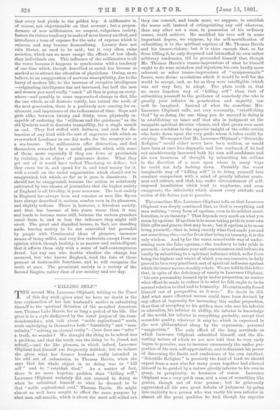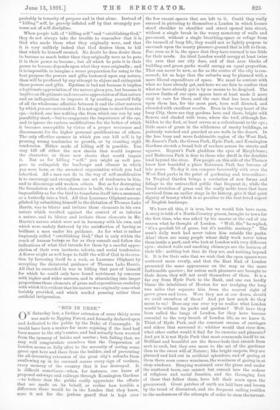"KILLING SELF."
THE second Mrs. Laurence Oliphant, writing to the Times of this day week, gives what we have no doubt is the true explanation of her late husband's motive in submitting himself to the spiritual dictation of the so-called American seer, Thomas Lake Harris, for so long a period of his life. She gives it in a style disfigured by the usual jargon of the tran- scendentalists, with talk about "noble aspirational " souls, souls embodying in themselves both " femininity " and " mas- culinity," "solving an eternal verity "—[how does one " solve " a truth, we wonder P We thought the thing to be solved was a problem, and that the truth was the thing to be found, not solved],—and the like phrases, in which, indeed, Laurence Oliphant had himself too frequently dabbled; but we believe she gives what her former husband really intended in his odd act of submission to Thomas Harris, when she says that his whole object in so doing was to "kill self " and to " establish God." As a matter of fact, there is no more hopeless problem than "killing self." Laurence Oliphant certainly did not succeed in doing so when be submitted himself to what he deemed to be that "noble aspirations" soul," Thomas Harris. He might almost as well have sought to effect the same purpose by what men call suicide, which is about the most self-willed act
they can commit, and tends more, we suppose, to establish the worse self, instead of extinguishing any self whatever, than any other act a man, in possession of his ordinary senses, could achieve. He modified his true self in some important degree, we suppose, by the self-mortification of submitting it to the spiritual caprices of Mr. Thomas Harris and his trance-visions ; but it is clear enough that, so far from killing it, he only deepened and intensified its own rather arbitrary tendencies, till he persuaded himself that, though Mr. Thomas Harris's trance-impressions of what he himself ought to do were mistaken and injurious, his own hardly more coherent or sober trance-impressions of " sympneumatic " forces, were divine revelations which it would be well for the world to accept, and, so far as they were intelligible (which was not very far), to adopt. The plain truth is, that no more hopeless way of "killing self" than that of submitting yourself to the guidance of somebody else who is greatly your inferior in penetration and sagacity, can well be imagined. Instead of what the sometime Mrs. Laurence Oliphant calls, not very reverently, "establishing God" by so doing, the one thing you do succeed in doing is in establishing an inner self that sits in judgment on the incapable spiritual director chosen, and that grows ever more and more confident in the superior insight of the critic within who looks down upon the very guide whom it takes credit for obeying. We suspect that Mr. Laurence Oliphant's "Scientific Religion" would either never have been written, or would have been at once less dogmatic and less confused, if h6 had • not mischievously increased both his own self-confidence and his own looseness of thought by submitting his actions to the direction of a man upon whom in many ways he could not help looking down. Probably the worst imaginable way of "killing self" is to bring yourself into constant comparison with a mind of greatly inferior acute- ness and culture, and that, too, under circumstances of self- imposed humiliation which tend to emphasise, and even exaggerate, the inferiority which almost every attitude and action of life forces you to perceive.
The sometime Mrs. Laurence Oliphant tells us that Laurence Oliphant was deeply convinced that, as God is everything and man nothing, "every form of egotism, even in its mildest mani- festation, is an insanity." That depends very much on what you mean by egotism. If egotism is to mean taking pride in your own little gifts and graces, that may be so ; but if egotism is to mean being yourself, —that is, being exactly what God made you and not something else,—so far from that being an insanity, it is the only wisdom. And by far the worst conceivable way of under- mining even the false egotism,—the tendency to take pride in yourself,—is to stimulate your self-consciousness and irritate its vanity by submitting to a spiritual influence which, so far from being the highest and wisest of which you can conceive, is daily proved to be a very pinchbeck sort of spiritual influence against which the inner nature steadily rebels. We are told in this letter that, in spite of the deficiency of vanity in Laurence Oliphant, "his own personality loomed up in undue proportion, no matter what effort he made to reduce it to what he felt ought to be its normal relation to God and to humanity. He continually found himself out of perspective, as it were." No doubt he did. And what more effectual means could have been devised by any effort of ingenuity for increasing this undue proportion, than that of accepting as his guide a man who was his inferior in education, his inferior in ability, his inferior in knowledge of the world, his inferior in everything, probably, except that recondite quality, whatever it may be, which is expressed in the new philosophical slang by the expression, personal 4' magnetism." The only effect of the long servitude to which Laurence Oliphant submitted himself, and the dis- torting nature of which we are now told that he very early began to perceive, was to increase enormously the undue pro- portion of his own self-appreciation, and to diminish his power of discerning the limits and confusions of his own intellect. "Scientific Religion" is precisely the kind of book we should expect from a man who for many years together had allowed himself to be guided by a nature greatly inferior to his own in grasp, in perspicuity, in keenness of vision. Laurence Oliphant was a very quick man, and a man of something like genius, though not of true genius ; but he grievously aggravated all his own great defects of judgment by going into captivity to a person who was vastly his own inferior in almost all the great qualities he had, though his superior probably in tenacity of purpose and in that alone. Instead of "killing ". self, he gravely inflated self by that strangely per- verse act of self-discipline.
When people talk of "killing self "and "establishing God," they do not always take the trouble to remember that it is God who made them what they originally were, and that it is very unlikely indeed that God desires them to kill that which he himself created. No doubt he does desire them to become as much better than they originally were as he puts it in their power to become ; but all which he puts it in their power to become depends upon what they were originally; and it is impossible to imagine a worse preparation for using to the best purpose the powers and gifts bestowed upon any nature, than will be produced by any attempt to abjure and extinguish those powers and gifts. Egotism is bad not because it implies a legitimate appreciation of the nature given you, but because it implies an illegitimate and excessive appreciation of that nature ,and an indisposition to improve it by availing yourself fully -of all the wholesome affinities between it and the other natures by which you are surrounded. It is not egotism to start from the .ego,—indeed, one has nothing else from which one can by any possibility start,—but to exaggerate the importance of the ego, and to ignore the various modifications for the better of which it becomes susceptible by virtue of a proper reverence and discernment for the higher personal qualifications of others. 'The only effective manner in which you can kill self, is by pruning wrong tendencies to growth, or by stunting right tendencies. Either mode of killing self is possible. You anay kill off either the new shoots that would improve the character, or those new shoots that would impair it. But as for killing "self" you might as well pro- pose to extinguish the landscape and climate in which you were born, or the ancestral organisation which you had inherited. All a man can do in the way of self-modification is to encourage and strengthen one set of tendencies in him, and to discourage said weaken others. But as for destroying the foundation on which character is built, that is as sheer an impossibility as for the bird to transform itself into a mammal, or a butterfly into a bird. All that Laurence Oliphant accom- plished by submitting himself to the dictation of Thomas Lake Harris, was to blister and irritate those elements in his own nature which revolted against the control of so inferior a nature, and to blister and irritate those elements in Mr. Harris's nature which were not in harmony with his own, and which were unduly flattered by the satisfaction of having so brilliant a man under his guidance. As for what is rather impiously called "establishing God," that is only within the reach of human beings BO far as they consult and follow the indications of what God intends for them by a careful appre- ciation of their own instincts, talents, and social tendencies. A flower might as well hope to fulfil the will of God in its crea- tion by fastening itself to a rock, as Laurence Oliphant by accepting the dictatorial guidance of Thomas Lake Harris. All that he succeeded in was in killing that part of himself for which he could only have found nutriment by converse with higher and wider natures, and in stimulating into larger proportions those elements of gross and superstitious credulity with which it is evident that his nature was originally somewhat lavishly provided, and which needed pruning rather than artificial invigoration.



































 Previous page
Previous page